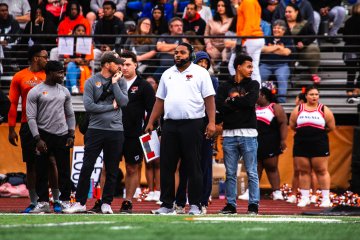
Longtime Coach Blaise Faggiano’s Coaching Tree is Growing
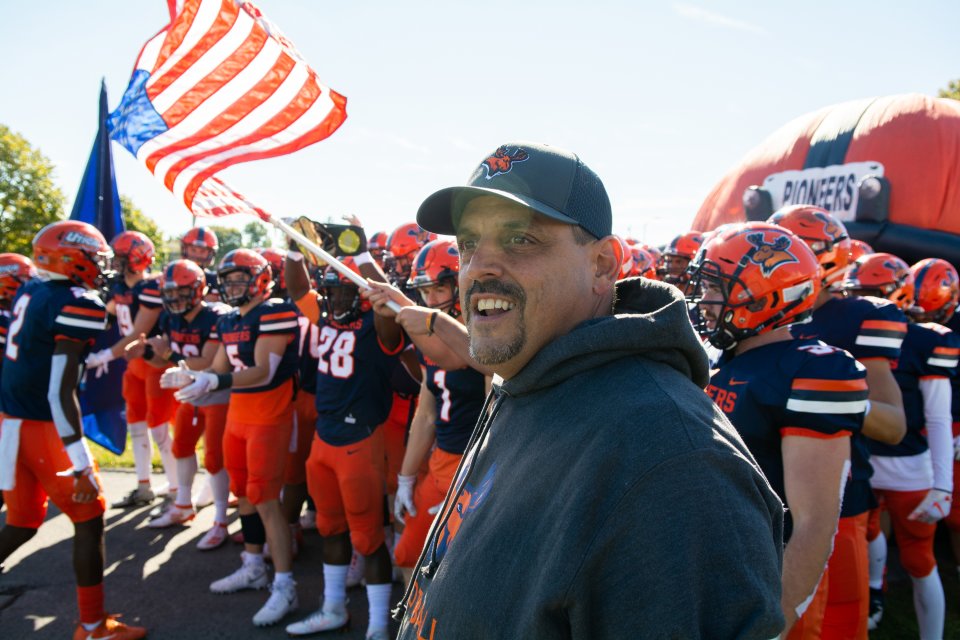
“I tell people all the time, Coach Faggiano is the best people person I’ve ever met. (It’s) just how he treats people.”
It’s been 17 years since Blaise Faggiano first took the sidelines as head football coach at Utica University. He’s laid down strong roots over that time, not only at Utica, but across the football coaching profession.

Lazarus Morgan ’08, G’14 is a proud branch on the Faggiano coaching tree. The former Pioneers defensive back coached under Faggiano for five seasons before being hired as defensive coordinator at Alfred University and then SUNY Cortland. This fall, he completed his second season as the head coach at Buffalo State.
“I’ve watched how he’s built the program at Utica, and I’ve implemented a lot that here at Buffalo State,” says Morgan, who took over a 0-10 team and has improved its win totals in each of his first two seasons. “Certain aspects of how we play (schematically), I’m sure, resemble some of what I picked up at Utica, but the core values behind his coaching philosophy are what I’ve definitely taken with me.”
Morgan is one of three former Faggiano assistants now serving as Division III college head coaches, joining Curt Fitzpatrick, who last month was hired at Division I Colgate University, and Keystone College’s Justin Higgins. Additionally, 29 former graduate assistants under Faggiano are currently college assistant coaches, across Divisions I, II, and III.
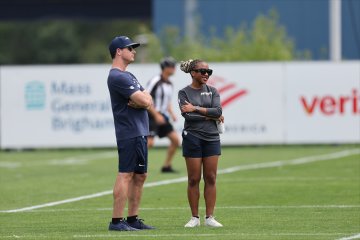
But Faggiano's reach extends far beyond the college football sidelines. His coaching tree numbers seven high school head coaches, 28 high school assistant coaches, and one NFL scout – Maya Ana Callender ’16, who is in her second season with the six-time NFL champion New England Patriots.
They are numbers in which Faggiano takes great pride, and he hopes will continue to grow.
“You wake up 17 years later, and you’ve got 70 coaches out there, and they’re having incredible success,” he says. “It’s a special feeling knowing you had a small hand in that success.”
His protégés are making their mark on the game in very big ways.
Fitzpatrick led Cortland to its first-ever national championship in 2023. Morgan is the first African-American head football coach in the history of the Liberty League. Callender was first female director of football operations in the Ivy League, and in 2023 was hired as the first full-time female member of the Patriots scouting department.
Faggiano’s influence on their careers extends far beyond coaching strategy. Truth be told, there are only so many systems of Xs and Os in the sport of football. To a person, Faggiano’s former staffers will tell you his genius lies in his meta-skills – building culture, impacting team dynamics, inspiring future leaders – as well as his appreciation for the simplest of acts – extending kindness and opportunity.
“I tell people all the time, Coach Faggiano is the best people person I’ve ever met. (It’s) just how he treats people,” Morgan says. “He taught me how to take care of younger coaches, giving them opportunities and something as simple as staying late after work, taking them to dinner, and just getting to know them by who they are and not just what they do. He creates a family-like atmosphere within his program, and I’ve taken that with me wherever I’ve been.”
“He allowed me to gain not only a deeper knowledge about the game, but gain confidence and gain a voice,” Callender says. “He welcomed me into a male-dominated profession and made me feel, not only comfortable but made it feel like it was my place. Like I belong. After that, I could walk into any place knowing, ‘I can do this.’”
The Ford Legacy
Faggiano is a coaching disciple of Bob Ford. Ford coached for 44 seasons, 40 of which were at the University at Albany, where he gave Faggiano his coaching start as a graduate assistant. Faggiano counts himself among the more than 100 high school, college, and NFL coaches who began their careers under the legendary coach’s tutelage, an orientation of sorts that extended beyond football.
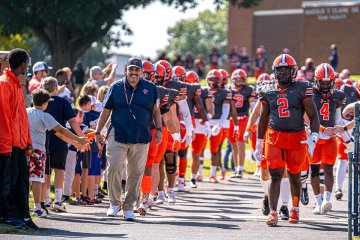
Ford was closely connected with the Catholic elementary schools in Albany, most of which did not employ physical education teachers. He made arrangements with the schools to have the graduate assistants on his coaching staff teach physical education courses part-time, which, from a practical standpoint, helped the budget-challenged schools fill a void and allowed the GAs to earn modest pay that they could use toward housing.
“I taught phys ed at St. Casimir’s School on Second Street in the city of Albany,” Faggiano recalls, laughing. “The other GAs were out in the suburbs. I’d go out to their schools and borrow dodgeballs.”
St. Casimir’s served students from a wide range of racial, ethnic, and socioeconomic backgrounds. The experience it offered Faggiano more than made up for the school’s lack of resources.
“I remember going into his office after my first day (at St. Casimir’s) saying, ‘Coach Ford, I just thought I should let you know that you sent me to teach gym at a school that doesn’t have a gym,’” Faggiano says. “He just looked at me and said, ‘Blaise, I sent you there because you understand diversity. I know you’ll figure out the rest, and you’ll be fine.’”
Ford is the 2025 recipient of the American Football Coaches Association (AFCA) Amos Alonzo Stagg Award, which is presented in part to recognize individuals who influence and set an example through their association with the game of football. His 265 career victories place 22nd on the all-time Division I list. However, in line with the spirit and purpose championed by the Stagg Award, it was Ford’s impact off the field that left an impression on Faggiano and help mold him into the coach he is today.
“I’m a part of Coach Ford’s coaching tree. I saw the impact that he had on me and on everyone who touched the program,” Faggiano says. “I knew if I ever had the opportunity, I wanted to impact people’s lives in a similar way.”
Book of Success
Shortly after taking the job at Utica, Faggiano began compiling a coaches’ handbook. The book, now in its seventeenth edition, is an omnium gatherum of coaching philosophies, core values, and, deliberately to a much lesser extent, game strategy.
“It covers my expectations of our coaching staff and how we are going to coach – our philosophy of coaching and teaching, and all the different things that go into building a successful program,” he says. “Because it’s not just about offense and defense – or, at least, I don’t think it should be.”
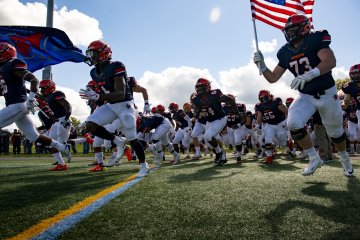
The Faggiano coaching doctrine now dots bookshelves in coaches’ offices across New York state and beyond.
“Whether it’s a college coach or Matt McCoy (’19), who’s the head coach down the road at (Vernon-Verona-Sherrill) High School, to watch all these guys take (the handbook) to where they’re coaching now, use it in their programs, and add their own ideas to it is pretty wild.”
Faggiano hears from his former assistants often. In addition, the entire group religiously reunites every year for “Utica Night” at the AFCA Convention, a group that includes members from all corners of football. There is no brightest star – or strongest branch – among the group, only a fraternity of coaches bonded by a common lineage and philosophy.
“The word’s out there that Utica has great coaches – coaches who know how to teach and develop not just student-athletes, but young coaches too,” Faggiano says. “I couldn’t single anyone out, even if I tried. For example, you’ve got someone like Jared Keyte (’12) who was just named defensive coordinator at UMass, and I’ve got just as much pride in Marcus Gurdineer (’10) who’s a high school head coach down in New Jersey, doing great things and making a positive impact on the lives of young men.
“We talk all the time about, ‘What is success?’ It’s about other people. To think that we’re built this family here – and maybe I’ve had some impact on some other folks – is truly a blessing.”
More Stories
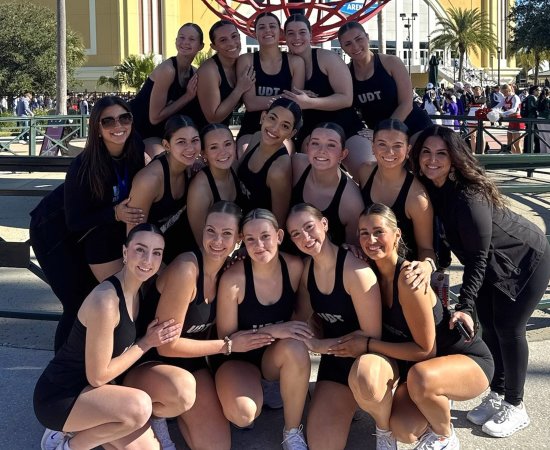
Utica University Dance Team competes in Nationals
The Utica University Dance Team competed at the Universal Dance Association (UDA) Collegiate National Dance Championships in Orlando, Florida this...

Meet the New Provost: Dr. Ann Damiano
As President Stephanie Nesbitt takes the helm of Utica University this year, the Office of Academic Affairs also welcomes Dr....
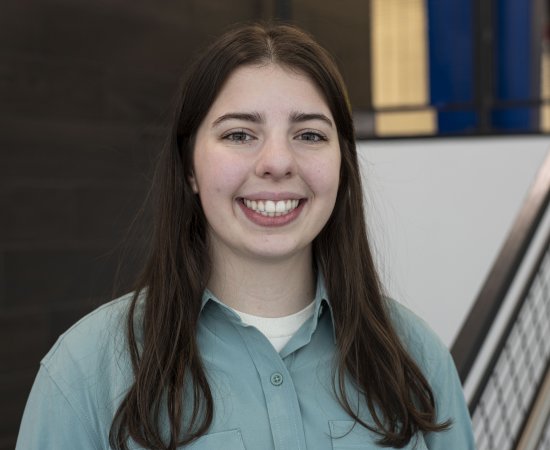
Keep Looking Up: Sydney Kinsella ’26
For centuries, human beings have looked to the stars in search of meaning. Sydney Kinsella ’26, along with her...
I would like to see logins and resources for:
For a general list of frequently used logins, you can also visit our logins page.
